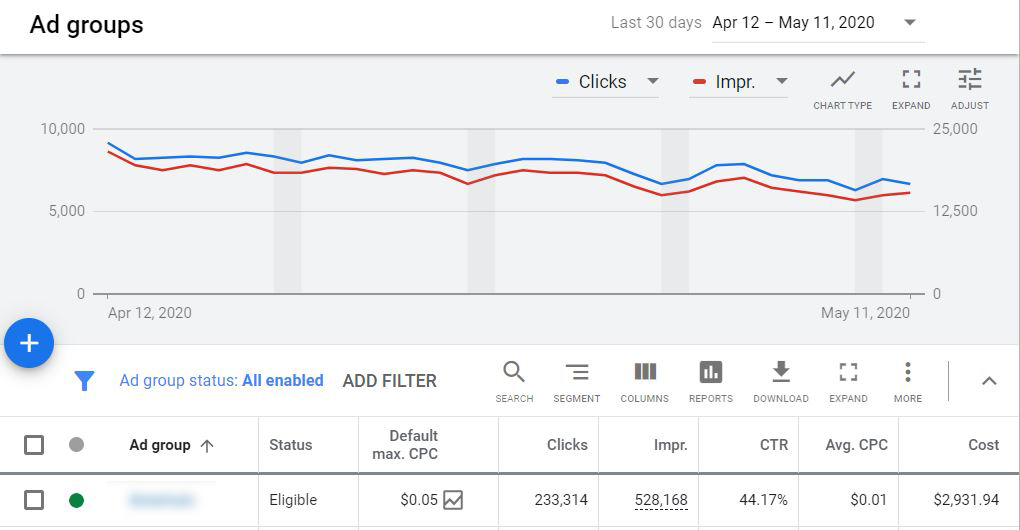A one cent click? Is that possible? We hear complaints on a daily basis how much the cost of digital advertising has gone up. Remember when you could be profitable in your niche simply by putting some keywords into Google Ads and making a boatload of cash? Those good old days are gone.
Or are they?
To be clear we’re not talking about Google Display, or YouTube, or Facebook or anything else. We’re talking about Google search text ads. Go to Google.com, type in your keywords, and get clicks for $0.01.
Yes, it is possible. And we’ll show you how.
Before we get there, let’s address a few things. First and foremost, you can still get clicks for $0.01 in 2020. And you can get lots of them if you’re in the right niche. Here’s a screen shot from the last 30 days:

For all you pros out there let me answer your first question. No, this is not a branded search term. It is a broad match, non-branded term. Can you imagine those impression numbers on a brand search? That would be awesome.
Now I can hear you getting grumpy at me. You think I’m full of it. You’ve tried everything and it just can’t happen on Google search anymore. Not with those numbers.
We were in the same boat until we were able to find the right mix of ingredients to cook up some awesome results. Let’s go over those now.
How They Make Money
OK, here’s a little bit of math for you detail oriented people out there.
This site makes money by serving ads through Google AdSense. If you’re not familiar with it, it’s ads on a page that generate revenue based on clicks and impressions. Think of the ads you see when you visit a free news site, or a sports page. Those ads generate revenue for the site owner.
This client earns $0.009 (a little less than a cent) per page view from Google AdSense alone. There are other advertising products out there, but let’s keep it simple.
That’s the first part of the math: For every page that someone views on their site, they get $0.009.
The second part of the math is the average number of page views per visitor is 2. Said another way, each person who visits the site views an average of 2 pages. So for each visitor they earn $0.018 in revenue, or almost 2 cents ($0.009 per page view x 2 page views per visitor = $0.018 in revenue). Still with me?
The bottom line is if they can bring people to the site for anything less than $0.018, they make money from each one of those visitors.
It turns out, across all devices in a 30 day period we were able to bring non-branded paid search traffic to the site for a blended cost of $0.0126 per click (above you see they spent $2,931.94, and generated 233,314 clicks, which is $2931.94/233314 = $0.0126 per click. As above this is rounded down to $0.01 per click = OCC).
So their bottom line profit is $0.0054 per click ($0.018 – $0.126 = $0.0054), or just over half a cent per click.
Since they got 233,314 clicks in the last 30 days, they generated a PROFIT of $1259.90 from AdSense from this one campaign in 30 days. That doesn’t even take into account the other display ads they have on the page, or the value of the 528,168 ad impressions, or any other revenue from the products they sell. They made a LOT more than that, but I’m trying to keep it simple here.
That’s right. No CPA calculations, no complex conversion calculations, just straight math. Every person who visits their website generates cash for them.
The secret sauce: How did they get to One Cent Clicks?
Site Authority
The client is a company who has an established brand presence across North America in multiple channels, not just digital and paid search. So there is a ton of support for the website in general. They have great SEO and are generating tons of organic page views per month.
This gives the site tremendous authority as far as the search algorithm is concerned, and the short version is the more authority, the cheaper the cost per click (CPC).
Quality Score
Quality score is a term that Google (and others) use for determining how relevant your ads and targeting are for the end user, based on their search terms.
The reason this is important is the higher the quality score, the lower your CPC. Higher score = cheaper clicks on ads.
Here the quality score numbers for this campaign are 10/10 (and that is as good as it gets).
Keywords
Relevant keywords are a huge factor in determining how much you pay per click. The more relevant, the cheaper the clicks.
Let’s say for example your site is an authority on dog treats, and you start advertising for vacation packages, Google will make it very expensive for you to show your ads for vacation packages because you have a dog treats site. Those ads are not relevant.
Google wants people coming back to their site, google.com, and clicking on more ads. They really don’t care about your site, but they want to serve relevant results to keep you coming back to google.com to find what you’re looking for.
That’s how they make 95+% of their money. If you’re looking for a vacation and you end up on a dog treats site, you aren’t coming back to start your search on Google.
Ads
Your paid search ads, although seemingly simple, are actually a complex mix of motivation and inspiration within a set number of characters. You want people to click, so you write your ads in as compelling a way as possible.
Ads are the glue that hold the whole process together. They impact your quality score by aligning with the keyword search term people type in the search box.
A relevant ad, showing when a keyword is typed in, will result in a high click through rate (CTR). Bottom line, the higher the CTR, the better.
Back to my vacation packages keywords and dog treats keyword example, you could write an ad that says ‘Great treats for your dog, and great deals on hotels, click here”.
It’s a little relevant, and kind of reflects the keywords typed in, but wouldn’t get a high quality score because of the questionable user experience. Are you advertising for dog treats? For vacation packages?
What are they going to experience when they click on the ad?
That brings us to landing pages.
Landing Pages
You want to have great alignment from your keywords, to your ads, to your landing pages (the page that people see first when they visit your site. They ‘land’ there.)
If you sell dog treats, your keywords should specify ‘dog treats’. Along with relevant and aligned keywords, your ads should support the fact you sell dog treats.
Ad copy such as ‘Amazing deals on dog treats for the fur-baby you love’ would align very well with what you do if you sell dog treats.
Now when they click on the ad and get to the landing page, you want to show them a variety of dog treats. This creates alignment, and a great quality score.
Keyword ==>> Ads ==>> Landing Page
Really, it’s that simple.
People make it really complex for some reason, but this is it.
How do you get OCC?
So how did we do it? How did we get them tens of thousands of dollars in revenue from page views alone (not including actual purchases made)?
Step by step:
- Researched and discovered a niche they had a ton of authority in.
- Discovered some relevant keywords that had lots and lots of searches.
- Discovered there was very little competition for the keywords we could target.
- We ensured great alignment between keywords, ads, and landing page experience.
- We set up tracking and reporting, so they knew exactly what they were earning from each click.
- We maxed out their search impression share (showing their ads as often as possible).
Interested to see what opportunities there are for you? Get in touch, we’d be happy to help you figure it out.
About The Author
Dave Burnett
I help people make more money online.
Over the years I’ve had lots of fun working with thousands of brands and helping them distribute millions of promotional products and implement multinational rewards and incentive programs.
Now I’m helping great marketers turn their products and services into sustainable online businesses.
How can I help you?






